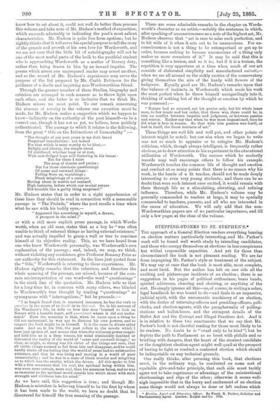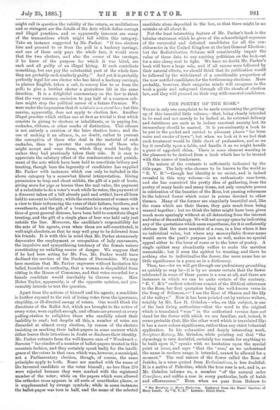STEPPING-STONES TO ST. STEPHEN'S.* THE approach of a General Election
renders everything bearing on election matters particularly interesting, and Mr. Parker's work will be found well worth study by intending candidates, and those who occupy themselves at elections in less conspicuous but withal responsible capacities. And yet for those thus circumstanced the book is not pleasant reading. We are far from impugning Mr. Parker's style or treatment of the subject. We may say at once that the book is most able, most complete, and most lucid. But the author has left on one side all the exciting and picturesque incidents of an election ; there is no suggestion in his pages of political enthusiasm, brass bands, spirited addresses, cheering and chairing, or anything of the sort. He simply ignores all this—as, of course, in writing a sober, legal handbook he was bound to do—and deals in an impassive, judicial spirit, with the unromantic machinery of an election, with the duties of returning-officers and presiding-officers, poll- clerks, and election-agents, with the paraphernalia of polling- stations and ballot-boxes, and the stringent details of the Ballot Act and the Corrupt and Illegal Practices Act. And it is in relation to these two enactments that we say that Mr. Parker's book is not cheerful reading for those most likely to be its readers. No doubt he is "cruel only to be kind "; but he depicts the path to Parliament as so beset with pitfalls and so bristling with dangers, that the heart of the stoutest candidate or the doughtiest election-agent might well quail at the prospect of having to fight or conduct a contested election which should be indisputable on any technical grounds.
One really thinks, after perusing this book, that elections must, in the ordinary way, be conducted on some sort of equitable give-and-take principle, that each side must tacitly agree not to take cognizance or advantage of the unintentional shortcomings and slips of the other; otherwise it seems well- nigh impossible that in the hurry and excitement of an election some things would not always be done or left undone which
• Election Agent and Returning Officer. By Frank B. Parker, Solicitor and Parliamentary Agent. London : Knight and Co. 1885. might call in question the validity of the return, so multifarious and so stringent are the details of the Acts which define corrupt and illegal practices, and so apparently innocent are many of the transactions which might fall within this category. 'Take an instance suggested by Mr. Parker. "If two electors hire and proceed to or from the poll in a hackney carriage, and one of them only pays the whole fare, it would seem that the two electors, and also the owner of the carriage, if he knew of the purpose for which it was hired, are each and all guilty of an illegal hiring. If each contribute something, but one pay the substantial part of the whole fare, they are probably each similarly guilty." And yet it is probably perfectly legal for one elector who has hired a hackney carriage, in plainer English, taken a cab, to convey him to or from the poll; to give a brother elector a gratuitous lift in the same direction. It is a delightful commentary on the law to think that the very common omission to pay half of a common cab- fare might stop the political career of a future Premier. We were under the impression that de minintis non carat ; but this maxim, apparently, does not apply to election law. Another illegal practice which strikes one at first as trivial is that which consists in giving to electors or inhabitants, or in paying for, cockades, ribbons, or other marks of distinction. This offence is not entirely a creation of the later election laws ; and the use of making it an offence, is, no doubt, rather to prevent the corruption of those who deal in the material of such cockades, than to prevent the corruption of those who might accept and wear them, which they would hardly do unless they had previously taken their side. It is easy to appreciate the salutary effect of the condemnation and punish- ment of the acts which have been held to constitute bribery and treating, though .here the ingenuity of candidates has supplied Mr. Parker with instances which can only be included in the above category by a somewhat liberal interpretation. Giving permission to trap and shoot rabbits, the gift of a pair of boots, giving more for pigs or horses than the real value, the payment of a substitute to do a voter's work while he votes, the payment of a discount taken off a bill already paid. and settled, have all been held to amount to bribery; while the entertainment of women with a view to their influencing the votes of their fathers, brothers, and sweethearts, and the gift of a breakfast to a starving man in a time of great general distress, have been held to constitute illegal treating, and the gift of a single glass of beer was held only just outside the line. Moreover, the candidate's responsibility for the acts of his agents, even when these are self-constituted, is well-nigh absolute, so that he may well pray to be delivered from his friends. It is with this in mind that Mr. Parker strenuously deprecates the employment or recognition of lady canvassers, the impulsive and sympathising tendency of the female nature constituting an unfailing source of danger. We suppose that if he had been acting for Mr. Fox, Mr. Parker would have declined the services of the Duchess of Devonshire. We may here mention that Mr. Parker expresses without hesitation his belief, founded on authority, that a woman is disqualified from sitting in the House of Commons, and that votes recorded for a female candidate would inevitably be thrown away. Miss Helen Taylor, apparently, is of the opposite opinion, and pre- sumably intends to test the question.
Apart from the actions of himself and his agents, a candidate is further exposed to the risk of losing votes from the ignorance, stupidity, or ill-directed energy of voters. One would think the directions of the Ballot Act, which are brought to the notice of every voter, were explicit enough, and officers are present at every polling-station to enlighten those who candidly admit their inability to read ; but despite all this, a number of votes are discarded. at almost every election, by reason of the electors insisting on marking their ballot-papers in some manner which tither leaves their intentions in doubt or discloses their identity. Mr. Parker extracts from the well-known case of " Woodward v. Sarsons " fac-similes of a number of ballot-papers treated in this eccentric fashion, and they certainly speak badly for the intelli- gence of the voters in that case, which was, however, a municipal, not a Parliamentary election, though, of course, the same principles apply to both. Some are marked with the name of the favoured candidate or the voter himself ; no less than 294 were rejected because they were marked with the registered number of the voter ; while on the papers which were allowed the orthodox cross appears in all sorts of unorthodox places, or is supplemented by strange symbols ; while in some instances the ballot-paper was torn in half, and the name of the selected candidate alone deposited in the box, so that there might be no mistake at all about it.
Not the least interesting feature of Mr. Parker's book is the tabular statement which he gives of the acknowledged expenses of the successful and defeated candidates for all the con- stituencies in the 'United Kingdom at the last General Election ; but the Redistribution Scheme will considerably impair the value of these data to any aspiring politician on the look-out for a nice cheap seat to fight. We have no doubt Mr. Parker's book will have a large sale, and if all causes were followed by their natural effects, we should think that its publication would be followed by the withdrawal of a considerable proportion of the now notified candidates for the forthcoming elections. More probably, however, their sanguine minds will recognise in. the book a guide and safeguard through all the shoals of election law, and they will proceed on their way with renewed confidence.



































 Previous page
Previous page